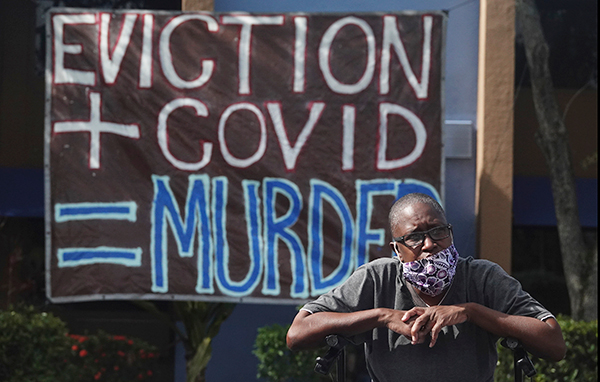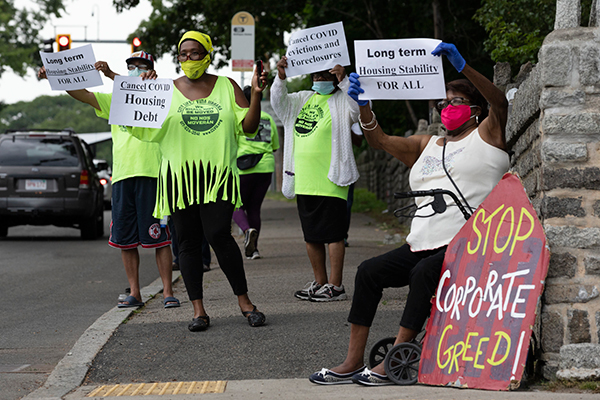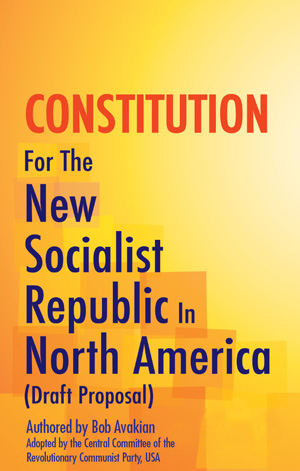Coronavirus and a System in Crisis:
Tidal Waves of Evictions, Mass Impoverishment Loom
| revcom.us
Millions of people in the U.S. are living on the brink of disaster. On July 24, a four-month moratorium (delay) on evictions that was part of the Coronavirus Aid, Relief, and Economic Security (CARES) act ends for many people. On July 31, a $600 weekly increase of unemployment checks for people laid off from their jobs ends.
“We’re looking at 20 million to 28 million people in this moment, between now and September, facing eviction.... That means that there are a number of evictions that are just waiting for the sheriffs to execute.... And right now, 29 states lack any state level moratorium against evictions,” Emily Benfer, chair of the American Bar Association’s Task Force Committee on Eviction, said in a July 10 interview.1
Homelessness and Evictions—Acute Expressions of a Systemic Condition
Homelessness and evictions are one of the most prominent features of capitalism-imperialism’s grip on the entire planet. Globally, at least 150 million people are completely homeless, and experts estimate that 1.6 billion people—more than 20 percent of the world’s population, are “housing insufficient.”2 Within the U.S., almost 600,000 people were homeless before the virus hit.3 Homeless encampments are a commonplace sight in virtually every city in the country.4
The deep oppression of Black people baked into every aspect of U.S. society is expressed in the disproportionate toll evictions and homelessness takes. Black and Latina/o households are about twice as likely as white households to rent their homes.5 Black people are about 13 percent of the U.S. population but “account for 40 percent of people experiencing homelessness and more than 50 percent of homeless families with children. Other racial groups and ethnicities are also overrepresented, but African-Americans make up the largest group.”6
In a study of homelessness in Milwaukee, Princeton sociologist Matthew Desmond found, “The eviction court survey population was predominantly Black (74 percent) and poor. The majority paid at least 50 percent of their incomes for rent, and one-third devoted more than 80 percent of their incomes for rent. Only 6 percent received housing assistance.”7 Desmond wrote that “in Milwaukee’s poorest Black neighborhoods, eviction had become commonplace—especially for women... If incarceration had come to define the lives of men from impoverished Black neighborhoods, eviction was shaping the lives of women. Poor black men were locked up while poor Black women were locked out.”8
Decent, livable housing is a basic human need. But as Bob Avakian breaks down in his article “‘Preliminary Transformation Into Capital’ ... and Putting an End to Capitalism,” under the system of capitalism-imperialism, human need is subordinated to the need of capitalists to make investments they think have the greatest likelihood of not only returning their initial investment but making a profit on it. The massive housing bust and foreclosure crisis that began in 2008 forced about 10 million homeowners to lose their property.9 It also accelerated tendencies that focused future development on high-cost housing, drove up almost all rents nationwide, and further concentrated ownership of rental units in the hands of “institutional investors ... including partnerships, companies, trustees for estates and nonprofit organizations.”10
This relentless quest for maximizing profit from housing rentals was facilitated by government policy. The New York Times reported that “dozens (of financial companies) in the U.S. ... load(ed) up on foreclosed properties at a discount of 30 to 50 percent and rent(ed) them out. Rather than protecting communities and making it easy for homeowners to restructure bad mortgages or repair their credit after succumbing to predatory loans, the government facilitated the transfer of wealth from people to private-equity firms. By 2016, 95 percent of the distressed properties ... were auctioned off to Wall Street investors without any meaningful stipulations.”11,12
The CARES Act and “A Perfect Storm of Human Suffering”
The main purpose of CARES (which also funneled massive amounts of money to corporations, large businesses, and various institutions) was not to enable the tens of millions of people already living gig to gig, or check to check (whether paycheck or unemployment check), from being thrown into the street, or to enable them to provide food, medicine, and other necessities for their households. It was mainly intended to keep the entire U.S. economy from taking on further damage, and to mute the potential for widespread discontent and possible outpourings if tens of millions of people were abruptly without homes or any means of support as a pandemic raged across the country.
While CARES temporarily prevents landlords from evicting tenants living in properties backed by federally supported mortgages, and renters in federally assisted housing, all rent payments not met while CARES is in effect must be fully paid, either immediately when it ends, or through an agreement reached between the landlord and tenant. For many people, the debt they face as and if society emerges from this pandemic is mounting as time runs out on CARES.
Many states, including California, have announced extensions of the moratorium. Others, such as Texas, are not moving to extend it. Various politicians have proposed measures to extend the moratorium, and to continue the enhanced unemployment money. But whether any of that will happen at all, and to what extent the eviction moratorium will be extended nationally, and unemployment check increases continued, hasn’t been settled.
Aaron Carr, executive director of the Housing Rights Initiative, summed up this situation in an interview with the website Vox: “The United States is facing an eviction crisis of biblical proportions. Allowing eviction moratoriums and expanded unemployment benefits to expire will undoubtedly lead to a perfect storm of instability, homelessness, and human suffering.”
A Turbulent Mix
Protests demanding a halt to evictions have begun breaking out across the U.S. Many more are likely. These protests are righteous and important in their own right, and should be supported. They are also entering into the turbulent “mix” of protest, uprising, and turmoil that is tearing at the social fabric of this country—the beautiful uprising against the plague of police murder of Black people, the protests of the Trump/Pence regime and their hordes of fascist supporters, the conflicts erupting around the government’s response to the virus.
As this turmoil continues and intensifies, masses of people are being jolted into protest and resistance, with millions and tens of millions of people beginning to question the nature of an economic and social system that routinely inflicts such suffering. People in these outpourings must be challenged to lift their sights to the necessity and possibility of revolution, and to contribute to and get organized into that revolution.
1. CNBC interview with Emily Benfer. [back]
2. As Cities Grow, So Does Number of Homeless, Yale Global Online. [back]
3. State of Homelessness, 2020, the National Alliance to End Homelessness. [back]
4. Sociologist Matthew Desmand told an Interviewer from the Marketplace website that in the U.S. in 2016 there were “… about 900,000 evictions. That equates to about an estimated 2.3 million people evicted in that year, many of them children. So, how do we get our hands around that number? That’s about 6,300 people a day that are evicted. That’s twice the number of people who die in car accidents every day in America.” In his book Evicted Desmond examines and explains how millions of people, in particular poor Black women in cities, are forced to shuffle constantly from one home to another, as they are repeatedly evicted from derelict housing and go on a desperate search for another equally bad or worse apartment, sent to homeless shelters, move in with relatives, and often forced outright to live on the streets. [back]
5. More US Households Renting Than at Any Time in 50 Years, Pew Research Center. [back]
6. State of Homelessness, 2020, the National Alliance to End Homelessness. [back]
7. How Housing Matters, The MacArthur Foundation. [back]
8. From excerpts from Desmond's book Evicted, in Locked Out, Wisconsin.uwalumni.com, Fall 2016. [back]
9. Many Americans Ended up Homeless During the Real Estate Crisis 10 Years Ago, Business Insider. [back]
10. Mom and Pop Own Fewer Rental Units, New York Times. [back]
11. A $60 Billion Housing Grab by Wall Street, New York Times. [back]
12. See Revolution article “The Illusions of Alexandria Ocasio-Cortez: Why Nothing Short of Revolution Will Meet the Needs of Humanity” for an analysis of why the false “solution” of simply placing homeless people in vacant apartment building constructed for the wealthy will not, and cannot, resolve the systemic problem of homelessness in capitalist society. [back]

Homeless man living in a shelter in Florida, spared eviction for the moment. (Photo: AP)

People rally for protection from evictions, June 27, near Boston. (Photo: AP)
Get a free email subscription to revcom.us:


